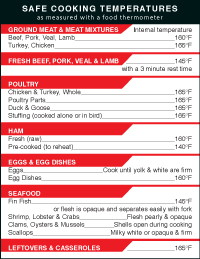Keeping Our Food Safe
By Kristi Mollner
We do many things to keep ourselves safe. We buckle our seat belts while riding in a car and look both ways before crossing a street. Well, we also need to take careful steps to keep the food we eat safe. Food safety is an important part of keeping food free from pathogens. These pathogens can make us sick with a foodborne illness.
Food safety involves the proper handling, preparing, and storing of food. Below are a few important steps to make sure the food we eat is cooked properly.
Wash, Rinse, Repeat

An important rule in food safety is to always wash our hands before we handle food. Our hands carry different pathogens that can contaminate food. For this same reason, we should also keep all items that are in contact with foods clean. This includes things like utensils, counter tops, and cutting boards. Additionally, we should wash off fruits and vegetables before preparing or eating them. They could have come into contact with a harmful bacterium or virus.
Food Boundaries
Cross-contamination is the transfer of pathogens from one thing or person to another. This can spread pathogens between foods. It can occur when handling raw meat, poultry, fish, or eggs.

These raw foods should be kept separate from ready-to-eat foods like fruits and vegetables. Cross-contamination is another reason we should always keep our hands and other surfaces clean. This helps avoid spreading any pathogens to the foods we touch.
Let’s Get Cooking
Cooking foods to their proper temperatures is another very important rule in food safety. When foods reach a high enough internal temperature, harmful bacteria that can cause foodborne illnesses are killed. Various meats and fish have a minimal internal temperature that should always be reached during the cooking process. Eggs should also be fully cooked before eating. Additionally, leftover foods should be reheated to their proper temperature just to be safe.
Keeping Things Cool

Keeping certain foods refrigerated is another important food safety rule. Pathogens reproduce faster in warmer temperatures, but the cold temperatures found within our refrigerators and freezers help to slow down the growth of pathogens. Foods including meat, dairy, fish, and eggs should not be left out at room temperature for more than two hours. When you finish eating, it’s best to put any leftovers in the refrigerator or freezer.
Together, these steps help us avoid or remove the pathogens that might be in our food. Follow these steps the next time you are cooking and you will be sure to enjoy a safe and pathogen-free meal.
Additional images from Wikimedia via Bill Branson (washing hands) and trekkyandy (washing broccoli).
Read more about: What's Lurking in Lunch?
Bibliographic details:
- Article: Keeping Our Food Safe
- Author(s): Dr. Biology
- Publisher: Arizona State University School of Life Sciences Ask A Biologist
- Site name: ASU - Ask A Biologist
- Date published: 30 Sep, 2014
- Date accessed: 7 April, 2025
- Link: https://askabiologist.asu.edu/keeping-our-food-safe
APA Style
Dr. Biology. (Tue, 09/30/2014 - 12:31). Keeping Our Food Safe. ASU - Ask A Biologist. Retrieved from https://askabiologist.asu.edu/keeping-our-food-safe
Chicago Manual of Style
Dr. Biology. "Keeping Our Food Safe". ASU - Ask A Biologist. 30 Sep 2014. https://askabiologist.asu.edu/keeping-our-food-safe
MLA 2017 Style
Dr. Biology. "Keeping Our Food Safe". ASU - Ask A Biologist. 30 Sep 2014. ASU - Ask A Biologist, Web. https://askabiologist.asu.edu/keeping-our-food-safe

Be Part of
Ask A Biologist
By volunteering, or simply sending us feedback on the site. Scientists, teachers, writers, illustrators, and translators are all important to the program. If you are interested in helping with the website we have a Volunteers page to get the process started.





